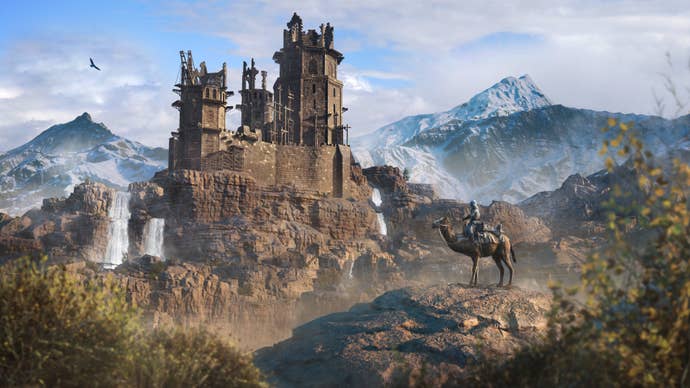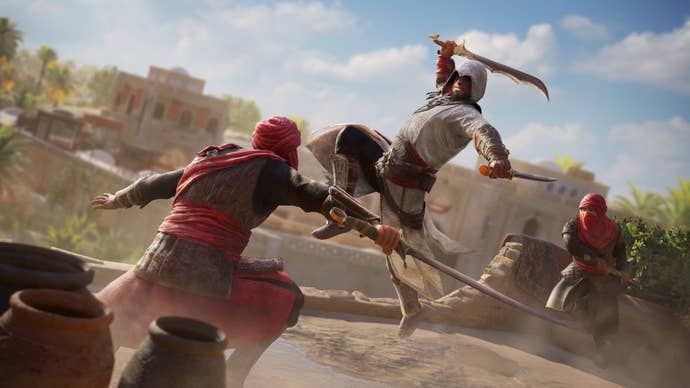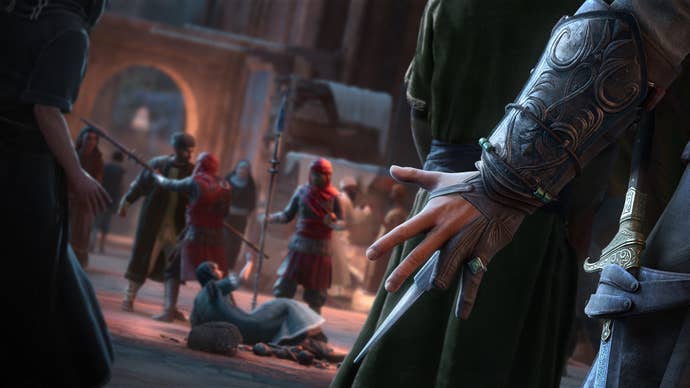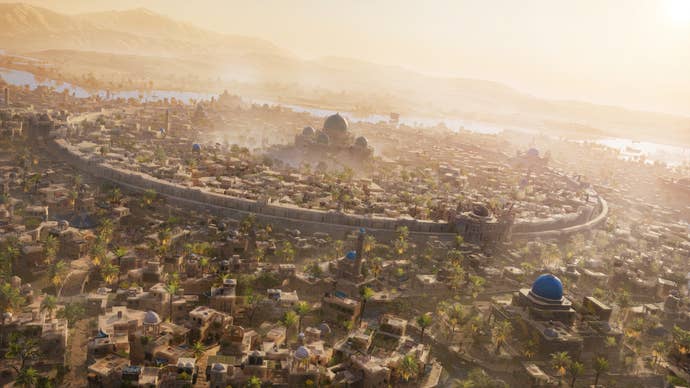[ad_1]
If we didn’t already know that Assassin’s Creed Mirage started life as a DLC add-on for Assassin’s Creed Valhalla, the HUD would have given it away: it’s virtually unchanged from the aforementioned previous entry in the series. The map icons have been replaced with ones more appropriate for the new protagonist and setting, but everything else during our extensive hands-on preview was exactly the same, right down to the font. And though this was a pre-release build, with less than a month to go before release it seems unlikely to change.
This isn’t a complaint, to be clear. Obviously there are more important things to discuss here than the typeface being used in the conversation system. But it betrays the fact that Mirage isn’t really the back-to-basics reset for the series that many die-hards are hoping for. Sure, it pays homage to the first game by being set in the Middle East and sporting a rekindled emphasis on investigation mechanics, and you are actually playing an Assassin this time, but make no mistake: Mirage is essentially ‘More Valhalla’. And considering how much Valhalla we already have (too much, frankly, hence Mirage’s back-to-basics marketing) that’s going to be a tricky proposition for a lot of people.
It’s not customary to be too critical during a preview, given that we are evaluating a small slice of an unreleased product, but it seems appropriate to put Mirage’s marketing as a sort of spiritual re-imagining of the 2007 original into some kind of context. That said, Mirage is so much better than any of Valhalla’s DLC expansions that it’s hard to disagree with it being spun-off into a standalone title. The DLCs were an endless slog of diminishing returns, padding out an enormous game that already had far too much padding.

Mirage, for its part, is retooled sufficiently enough that it feels much more exciting in the hands, and set so many thousands of miles away from the mud-slick desolation of Dark Ages England, with its notable lack of verticality and basic infrastructure, that it feels like returning to the golden light of civilisation after an extended trip to North Wales. In short, a great relief.
The combat has been tweaked to be a lot more high-stakes. About 15 hours into the RPG-style Creed games, you were generally able to get through most fights with your eyes closed. Parry, dodge, special, rinse repeat. Valhalla is one the few games that I, a fat-fingered idiot, have turned the difficulty up in, because it’s snore-inducing otherwise. That’s not the case here: Basim, a younger version of the character we end up meeting in Valhalla, is liable to get his head kicked in if you don’t keep your wits about you. Parry windows are just that little bit tighter, and he’s much less of a brute than Eivor can be, so relying on his finesse and quick-wits isn’t an optional tactic: it’s essential. We’re not talking raised difficulty here, to be absolutely clear. Mirage is just as Fisher Price as every other Ubisoft game, but the second-to-second decision making in combat is a lot more engaging.

So too are the investigation mechanics, which take a lot of inspiration from the very first game (bringing back eavesdropping and the like). There’s plenty of detective work to get on with in the RPG trilogy, but Mirage expands on it, and even features a few branching paths during a couple of points in the preview build. It’s necessary to go about some Point & Click-esque back and forth in order to uncover the identity of a target, and then later gain access to their lair. But it isn’t a linear checklist: opportunities present themselves that can be taken, ignored, or missed entirely. Depending on how well you’ve played the game up to this point, how many resources you’ve gathered, certain scenes can play out differently.
There’s a lot more depth to the rote sequencing of events we’re used to in the series, and while the end point is always a matter of inserting a length of metal into someone’s throat, the means to that end aren’t going to be the same for every player. This is an exciting prospect: Mirage may have considerably more replay value than any Assassin’s creed game before it. As someone who replays them all on a regular basis, that’s mouthwatering.

What’s also exciting is the prospect of exploring the bustling metropolis of ancient Baghdad. For its time, one of the preeminent bastions of global civilisation. There are such huge gaps in our knowledge about this city as it was at the height of its power that Ubisoft have obviously had to fill a lot of them in, but I’m sure they haven’t done its sheer size and splendour a disservice. Mirage’s Baghdad is a beautiful, vibrant city that teems with life in a way not seen in an Assassin’s Creed setting since Unity. That game’s Revolutionary Paris had such an intense sense of place that you could almost smell the gunpowder, and it’s a similar story here – though the smells are a lot sweeter.
Despite how much has been made of Mirage’s similarity to the original game’s setting (which honestly never sat right with me, given that 9th century Baghdad is about as far a cry from from 12th century Jerusalem as Zurich is from Hartlepool), there’s an explosion of colour and soft lighting here that couldn’t be any more different to AC1’s bleached out, over-exposed, Extremely Mid-2000s not-much-colour palette, and it’s probably a lot closer to something like Istanbul from the Ezio trilogy. Bustling, enticing, brimming with history. Everything an Assassin’s Creed location should be.

Cards on the table: I love Assassin’s Creed. Even the third one (it’s crap, don’t @ me). I’ve spoken at length on the site here and on our Youtube channel about how much the series means to me. So I’m very much the target audience for Mirage: I come pre-installed with reverence for the original game, I’m ecstatic about returning to the One Large City model of Unity (it’s brilliant, don’t @ me) that was so much more compelling and enveloping than the vast half-empty half-continents the RPG trilogy made us trudge through. I love those games too, but even I have to admit that Valhalla was (and still is, to be honest) a slog.
I’m not sure if Mirage will be a good place to return to the series for those of you who got tired of it years ago. Narratively, it’s quite heavily tied to certain lore-critical revelations in Valhalla. And as a jumping on point for newcomers, it would be absolutely baffling. Whatever the beancounters at Ubisoft HQ are projecting, on an artistic level Mirage feels more like a reward for the faithful than it does a back-to-basics reset. Unburdened though it may be from the bloat that weighed down its immediate predecessors, it still has plenty of baggage.
But that’s OK. It’s fine for a series as enormous and seemingly unstoppable as Assassin’s Creed to assume a lot of prior knowledge. It’s part of the thrill of sticking with a series for so long. At some point, you can only preach to the converted, and Assassin’s Creed is at Supernatural Season 13 levels of being entrenched in its own mythology. So yes, it is More Valhalla, but in the best possible way: at the end of our preview session I couldn’t help but wish the rest of Valhalla had been like this too.
Assassin’s Creed Mirage is available on on Xbox Series X|S, Xbox One, PlayStation 5, PlayStation 4, and PC from October 5, 2023.
[ad_2]